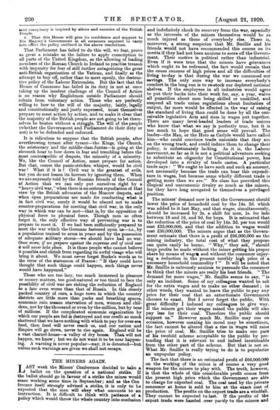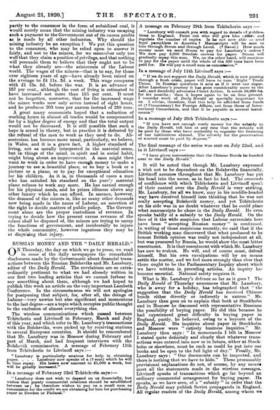111E MINERS AGAIN. L AST week the Miners' Conference decided to
take a ballot on the question of a national strike. If the ballot should go in favour of a strike the mines would cease working some time in September; and as the Con ference itself strongly advised a strike, it is only to be expected that the men will obey witiat amounts to an instruction. It is difficult to think with patience of a policy which would throw the whole country into, confusion. and indefinitely check its recovery from the war, especially as the interests of the miners themselves would be as much injured as those of everybody else. There is, moreover, a strong suspicion that Mr. Smillie and his friends would not have recommended this course on its merits if they had not been anxious to score off the Govern- ment. Their motive is political rather than industrial. Even if it were true that the miners have grievances which ought to be redressed, the fact would remain that the causa causans of high prices and all the difficulties of living to-day is that during the war we consumed our savings. The only sure way to increase everybody's comfort in the long run is to re-stock our depleted national shelves. If the employees in all industries would agree to put their backs into their work for, say, a year, waive all punctilios about men being skilled or unskilled, and suspend all trade union regulations about limitation of output, far more would be effected in the way of raising the standard of living than could be done by all the con- ceivable legislative Acts and rises in wages put together. There are many level-headed leaders of trade unions who know that what we say is perfectly true, but it is too much to hope that good sense will prevail. The leader—the Man, or the Hero as Carlyle would have called him—who could convince trade unionists that they are on the wrong track, and could induce them to change their policy, is unfortunately lacking. As it is, the Labour movement, so far as it is not a political adventure seeking to substitute an oligarchy for Constitutional power, has developed into a rivalry of trade castes. A particular trade says : " We ought to have such and such an amount, not necessarily because the trade can bear this expendi- ture in wages, but because some wholly different trade is getting more than we are." No class has provoked this illogical and uneconomic rivalry so much as the miners, for they have long arrogated to themselves a privileged position.
The miners' demand now is that the Government should lower the price of household coal by the 14s. 2d. which was added to it last May, and that wages, simultaneously, should be increased by 2s. a shift for men, ls. for lads between 18 and 16, and 9d. for boys. It is estimated that the reduction of the price of coal by 14s. 2d. per ton would cost £33,000,000, and that the addition to wages would cost £30,000,000. The miners argue that as the Govern- ment estimate that there is a profit of £66,000,000 on the mining industry, the total cost of what they propose can quite easily be borne. " Why," they ask, " should large profits be made without the miner getting his proper share by means of wage* and without the consumer enjoy- ing a reduction in the present terribly high price of a necessary household commodity ? " It will be noted that Mr. Smillie is extremely anxious to persuade the consumer to think that the miners are really his best friends. " The demand for more wages," Mr Smillie seems to say, " is only an incident. Some of my colleagues wanted to ask for the extra wage& and to make no other demand ; in other words, they wanted to leave the public to pay any price for their coal that an extortionate Government chooses to exact. But I never forget the public. With great difficulty I induced my colleagues to give way. If the miners get their wages raised the public will also pay less for their coal: Therefore the public should support us." However much Mr. Smillie may coo on occasion, however coaxing his mood may be sometimes, the fact cannot be altered that a rise in wages will raise the price of coal. Mr. Smillie tries to make one part of his twofold scheme acceptable to the public by pre- tending that it is relevant to and indeed inextricable from the other part of the scheme. But that is not so. What Mr. Smillie is really trying to do is to popularize an unpopular policy.
The fact that there is an estimated profit of £66,000,000 on the working of the mines is of course a very good weapon for the miners to play with. The truth, however, is that the whole of this considerable profit comes from the present high price which the Government are able to charge for exported coal. The coal used by the private consumer at home is sold to him at the exact cost of production. The profits on the export trade are a windfall. They cannot be expected to last. If the profits of the export trade were handed over partly to the miners and partly to the consumer in the form of subsidized coal, it would merely mean that the mining industry was escaping such a payment to the Government out of its excess profits as is made by all other industries. Why should the mining industry be an exception We put this question to the consumer, who may be relied upon to answer it fairly, and not to the miners, for we remember only too well that they claim a position of privilege, and that nothing will persuade them to believe that they ought not to be what they already are—the aristocrats of the Labour world. The wages of the miners—that is to say, for those over eighteen years of age—have already been raised on the average to £4 lls. 3d. a week. This wage compares with £1 15s. 5d. before the war. It is an advance of 157 per cent., although the cost of living is estimated to have increased not more than 155 per cent. It must not be forgotten, moreover, that for the increased wage the miner works now only seven instead of eight hours, and he produces 203 tons per annum instead of 259 tons.
A great many economists hoped that a reduction of working hours in almost all trades would be compensated for by a higher degree of energy and that the total output would not be decreased. It is still possible that such a hope is sound in. theory, but in practice it is defeated by the-refusal of the men to work as they used to do. Ab- senteeism has become more usual, particularly, we believe, in Wales, and it is a grave fact. A higher standard of living, not as usually interpreted in the material sense, but an things of the mind, in spirit and in social habit, might bring about an improvement. A man might then want to work in .order to have enough money to make a journey- to see a--beautiful place, or to buy a book or a picture or a piano, or to pay for exceptional education for his children. As it is, in thousands of cases a man who has satisfied Ins standard on the pure1.37 material plane refuses to work any more. He has earned enough for his physical needs, and he prizes idleness above any other luxury which he can afford. In essence, however, the demand of the miners is, like so many other demands now being made in the name of Labour, an assertion of the right to decide matters of public .policy. The Govern- ment alone are the proper custodians of revenue. In trying to decide how the present excess revenue of the mines shall be disposed of, the miners are trying to usurp the functions of government, and incidentally to injure the whole community, however ingenious they may be at disguising that injury.



































 Previous page
Previous page